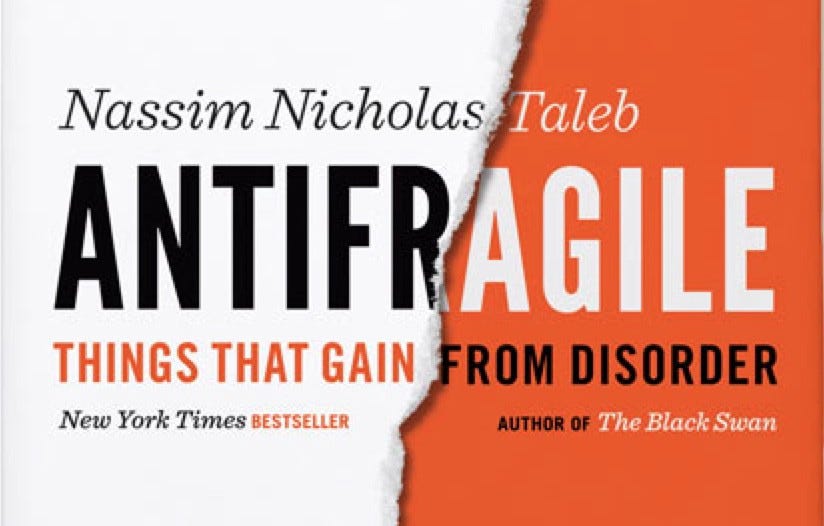“Life is difficult. This is a great truth, one of the greatest truths. It is a great truth because once we truly see this truth, we transcend it”
The Road Less Traveled: A New Psychology of Love, Traditional Values and Spiritual Growth by M. Scott Peck
I’ve often thought that the words “….and uncertain” would add to this timeless piece of wisdom. For amidst the heightened economic, societal, and political shifts facing our world at present, life can feel a bit unsettling at times, a Sisyphean struggle.
For me, these inevitable periods are a reminder of the importance of finding strength in even the most difficult of experiences. It’s here where bestselling author Nassim Nicholas Taleb, one of the foremost thinkers of our time, is in a class by himself in terms of the wisdom he distills.
A former derivatives trader and mathematical finance practitioner, now thought leader, who examines themes on uncertainty, Taleb in his book Antifragile: Things That Gain from Disorder ( a followup to his bestseller The Black Swan), reveals some rich insights for thriving in an uncertain world.
If you find yourself struggling with these paradoxical times, this book is in my view should be an essential read. Erudite, witty, and iconoclastic, Taleb offers an uncommon message:
The Antifragile and Only the Antifragile Will Truly Survive
………Antifragility means that something does not merely withstand a shock but actually improves because of it
In the Black Swan, Taleb explores the highly improbable and unpredictable events that underlie almost every important disruptive period we experience. Many would argue that the Covid-19 pandemic is the most recent example of this.
In Antifragile, Taleb guides the theme of uncertainty to center stage, espousing its desirability, even necessity. He even goes as far as suggesting that things should always be viewed in an antifragile manner, used as a blueprint for living in a Black Swan world.
Unlike other books of supposed serious scholarship, Taleb’s book is refreshingly pragmatic if you are willing to dig deep into its narrative. As a curious reader, you’ll find it an engaging counterblast to the prevailing thought leadership and scholarship that predominates our world today.
The central theme of the book is “antifragility,” which Taleb defines in the Prologue:
“Some things benefit from shocks; they thrive and grow when exposed to volatility, randomness, disorder, and stressors and love adventure, risk, and uncertainty. Yet, in spite of the ubiquity of the phenomenon, there is no word for the exact opposite of fragile. Let us call it antifragile. Antifragility is beyond resilience or robustness. The resilient resists shocks and stays the same; the antifragile gets better.”
In The Black Swan, Taleb showed us that highly improbable and unpredictable events underlie almost everything about our world.
On the other hand, his follow-up book makes a thoughtfully convincing argument that antifragility is essential for enterprises, governments, and even individuals that desire to not only survive but thrive in an increasingly complex and volatile world.
Here is the takeaway refrain from the book:
“If you want to succeed and dominate, to separate yourself from the pack and become the last man standing in any area of life, it’s no longer enough to bounce back from adversity and volatility – to simply be resilient. You have to bounce back stronger and better. You have to become antifragile.”
I agree that getting one’s head around the concept of antifragile is mind-bending. To this point, here are a couple of useful examples from the book that help a bit in clarifying Taleb’s esoteric thinking.
Whenever sending something fragile through the mail, we all know that it should be carefully packaged and handled skillfully to prevent the contents from breaking. In other words, it needs to be protected from breakage and damage.
Taleb then pivots from this by using the example of how human bones inevitably get stronger when subjected to stress and tension. This is what he means by “antifragile,” which are those categories of things that not only gain from chaos and disruption but require it in order to survive and flourish.
On a practical level, Taleb in his book divides the world and all that it’s comprised of (people, things, institutions, lifestyles) into three categories:
Fragile — Robust — Antifragile
You fall into the category of fragile, he says, if you are the type who is inclined to steer around any and all disorder and disruption out of fear of the adverse impact it may have on your life. In other words, while you think you are remaining safe, Taleb believes that you're really making yourself vulnerable to the very shock that will rip everything apart.
Robust on the other hand is where you can stand up to the shocks without flinching, akin to a metal object that falls off the counter but does not break. This, he says, makes you stronger and more creative, better able to withstand the challenges you face. He believes that we should all aim to be antifragile.
But the holy grail according to Taleb is in antifragility where the shocks and disruptions have the effect of strengthening you and making you more creative. This, he says, makes you stronger and more creative, better able to adapt to each new challenge you face.
Taleb says we should all aim to be antifragile.
By way of a personal example, during some of my lowest points in recent years, I am reminded of a short period I endured wandering the streets of San Diego and Las Vegas without a home in 2019. While it was a very sad and unpleasant time for me, I can honestly say that it was one of the best things that could have happened to me in terms of strengthening my resolve to survive and thrive.
Looking back, I gained from the shock and volatility of this experience like a human body regaining gain strength after being injured.
Taleb in the book uses the story of Hydra from Greek mythology noting that……….
……..“it had many heads and every time one was cut off, two would grow back in its place. So even though it was harmed, the Hydra benefited because it was antifragile.”
In an interesting aside, Taleb asserts that books and the authors that write them should embrace a spirit of antifragility, noting that negative reviews should be welcome “…offering a truthful, unfaked badge of attention, signaling that it is not boring." He even states this as a compelling reason for one to go out and buy a book.
One of my favorite narratives in Antifragile is where he introduces a fictionalized character by the name of Fat Tony, a streetwise Brooklynite who is a savvy businessman in Taleb’s tales. Counter to someone with Ivy League, intellectual chops, Tony possesses an unorthodox, experiential approach to navigating bureaucracy in order to gain access to places closed off to others. Spartan in his mindset, he is nevertheless a worldly man whose thinking allows him to transcend those appearing to be wiser who end up losing it all.
Fat Tony’s superpower? —- asking all of the right questions while not necessarily not using all of the smarty pants words.
While naturally inclined toward the intellectual, I, too, find the majority of my own wisdom comes through lived experiences. Having had 1,100 Lyft passenger rides, I find that rideshare drivers possess hidden access to a world of perspective not typically found in the Ivory Tower of academia or the C-circles of business.
Now, a forewarning if you are now itching to read Antifragile. For starters, Taleb is not one to don kid gloves. With chapter titles like “Damocles and Hydra,” “The Cat and the Washing Machine,” and “Fat Tony and the Fragilistas,” his contrarian flair and no-holds-barred critique can feel as though it’s personally directed at you the reader. But then again, that’s what makes this book so damn fascinating.
Antifragile delivers both a philosophical treatise and a how-to guide for living and is certainly not for the weak-minded or those with ironclad egos. If you are a reader who is not open-minded, you’re likely to grimace at some of Taleb’s missives.
In the end, Taleb is an engaging writer who’s not afraid to throw a bit of shade at status-quo thinking. The book will take you to the mat, for sure, but it does so in a way that delivers a solid argument for making the uncertainties you face in life more of a friend than a foe.
You're Invited to Join Our Literary Journey!
Welcome to "Great Books, Great Minds," where my passion for books takes center stage. This endeavor is more than a project; it's a labor of love that's driven by countless hours of research and writing. It's my way of contributing to a world filled with community, connection, and meaningful conversations, all nurtured by the power of literature.
If you've found this digital newsletter to be a source of inspiration and insight, if you relish the opportunity to explore exceptional books alongside remarkable authors and fellow book enthusiasts, then I'd like to extend a special invitation to you.
Join our community as a valued supporting member with a subscription at just $6.00 per month or $60.00 per year. Your support fuels our literary journey and ensures that we can continue to bring you these enriching experiences.






